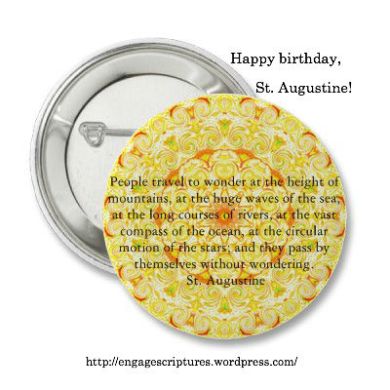Today is St. Augustine’s (as our Catholic brothers and sisters call him) birthday. Augustine (November 13, 354 – August 28, 430), with his warts and all, had been the most influential theologian of the church since the Apostle Paul. As the bishop of Hippo, North Africa, he had to conduct many eucharistic services among his many pastoral duties. The following quote shows his very serious view of the eucharist.
“That Bread which you see on the altar, having been sanctified by the word of God IS THE BODY OF CHRIST. That chalice, or rather, what is in that chalice, having been sanctified by the word of God, IS THE BLOOD OF CHRIST. Through that bread and wine the Lord Christ willed to commend HIS BODY AND BLOOD, WHICH HE POURED OUT FOR US UNTO THE FORGIVENESS OF SINS.” (St. Augustine, Sermons 227)
Whatever our view of the Lord’s Supper is, we must understand that the rite is a serious matter. Quite often within the evangelical church, our sermons are the sacrament of the worship service. Not so in the Catholic tradition! Augustine’s sermon above reminds us that the climax of Jesus’ ministry at the cross was only preceded by an equally serious rite of the ordinary meal turned extraordinary. Do we see the irony of “preaching” about the eucharist? It is only ironic if we favor the former over the latter. Sadly, the Lord’s Supper is often the afterthought of our services. Augustine reminded us with spoken word explaining the eucharist. His sermon demands that we not only to take the spoken word seriously but to take the Lord’s Supper even more seriously. The seriousness comes not only in the rite itself, but in life itself. The wonderment of life comes as a result of its sanctification by Christ’s work. When Jesus turned something as ordinary as eating into something quite extraordinary in the Lord’s Supper, hasn’t life become completely sacred in Christ?
Thus, let not each one of us who preach favor only our homiletic task as the most important event without considering the Lord’s Supper. The sermon is no more sacred than the place the Protestant tradition has accorded it. Augustine preached many sermons, but he also administered many eucharistic services. Both the eucharistic explanations and experiences are important. The sermon and life (illustrated by the Lord’s Supper) need to balance one another because both are sacred.


Sam:
When I conduct the Communion service, I take it very seriously. It is quite literally the most dangerous ritual in which the believer engages, as Brother Paul notes. Although I don’t believe in transubstantiation like our Catholic brothers and sisters, the sacrifice that these elements symbolize is serious enough to foster self-examination, confession and reconciliation.
yes, whatever our views are (and we can differ very much on this because of church tradition), it should be taken seriously and done with care. Too many free churches do the communion without much care or planning. The people just want to get done, go home and have their Sunday lunch.
拉比叔叔 :
曾經有位牧者與我分享.
她說 : 當守聖餐時, 若我們與人有不和或有問題未解決以先,
應當在守聖餐的時候, 切勿領這個餅和這個杯.
然後, 我們要立即盡快去處理好所有問題, 才可領這個餅和這個杯.
我在想 – 若問題很難或無法解決的話……
Ping Ping, You have to do your part. Then, after that, you’re fine. Does that makes sense?
知道 ! 謝謝拉比叔叔 🙂